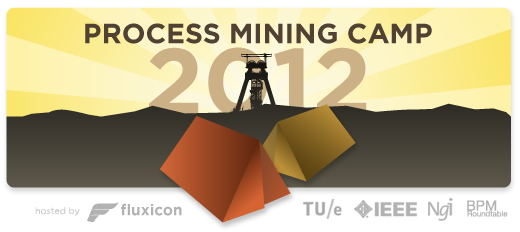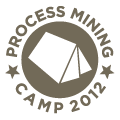As a warm-up for Process Mining Camp, we asked some of the speakers for an up-front interview. Previously, we already spoke with Bram and with Frank. You can read their interviews here and here.
Today, the interview is with Mieke Jans, a Manager at Deloitte Analytics Belgium.
Mieke has not only a PhD in process mining, but also lots of experience with projects with an auditing focus. At camp, she will share with you what she looks for in an ideal process mining tool.
Interview with Mieke
Anne: Can you still remember where and when you first heard about process mining? What exactly caught your attention and fascinated you about the topic?
Mieke: It was actually my supervisor of my PhD who pointed me to process mining. He had a thesis of a master student from Eindhoven University of Technology that introduced me to the topic.
At that time, I was already collaborating with a large SAP-using company for my dissertation, so I extended my research by combining their data availability and the new process mining possibilities.
Anne: Interesting to hear that you started out with SAP right from the beginning. SAP data is not the easiest to extract because the system is so complex and logs are not captured in a process oriented way. How difficult was it in your situation to get the data and put it together in a format that can be analyzed with process mining tools?
Mieke: No, SAP is not the easiest to begin with. I had a lot of difficulties finding the right tables and fields, because you need insights from both process owners and IT experts. I needed to couple the knowledge of different persons.
For example, one person knew exactly how the process (of procurement) took place at the front end of SAP, and another person helped me with the structure of the SAP-tables. I then had to connect the knowledge of these two different people in order to get the right information for process mining.
It took me 8-9 months to find the right data, have them extracted for me, and restructure everything into the right format. In the next step, I used PromImport at that time to convert my final flat file into MXML. A lot of TU/e people helped me with this last step.
Anne: Although 8-9 months is an extreme case to get to the right data, your example nicely illustrates why different kinds of people need to be involved in a process mining project. Both domain knowledge as well as knowledge of the underlying IT systems must be brought together, and in the middle is the process miner who bridges the gap between raw data and analysis. Which skills exactly do you think a person should bring or develop to become a good process miner?
Mieke: 8-9 months is indeed a long period of time, but this includes all the waiting time in between interviews and the learning time for myself to work with SAS to restructure all the SAP tables into the right structure.
A good process miner, I think, has an open mind and is eager to learn from both information technology specialists and domain experts. She also needs to keep on learning and adapting to new environments.
Anne: This is great advice for anyone who wants to get into this field. Thanks for the interview, Mieke! We look forward to seeing you at camp!
Would you like to hear more from Mieke about her experiences? Are you interested in sharing first-hand knowledge with fellow process miners? Register now to reserve your seat at Process Mining Camp on 4 June in Eindhoven. Tickets are free, but they are limited, and they are going fast…



